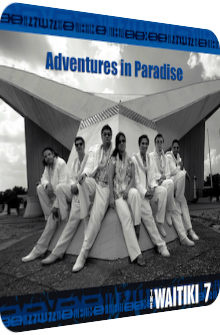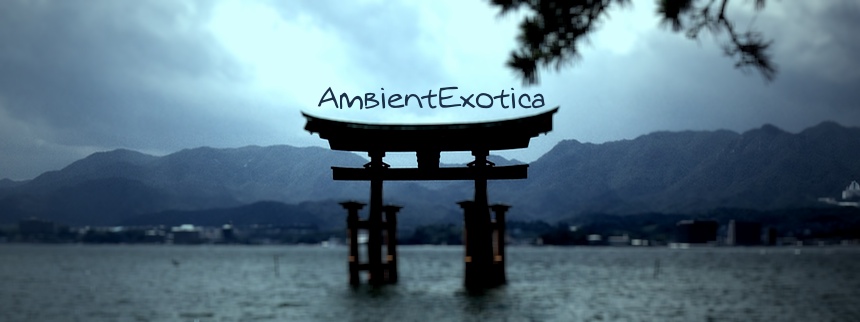
The Waitiki 7
Adventures In Paradise
2009
The Waitiki 7 are a partly Honolulu-, partly Boston-based incarnation of their former project which was simply called Waitiki. While the focus of the first combo already lied on a mixture of renditions and unique compositions, The Waitiki 7 enhance – and limit – this approach by featuring the same mixture of what they call »Classic Exotica for modern ears.« The use of synthesizers or similar electronic gadgetry, however, is now strictly forbidden and exchanged in favor of a real, definite and jazzy interpretation of the golden 50's and shimmering 60's when the genre was at its peak.
The band consists of a first-class lineup, even though it misses Brian O'Neill who was part of Waitiki, but is now on permanent duty with his diverse big band and third-stream quartet projects under the name of Mr. Ho's Orchestrotica. However, quite a few of the 7 players are well-known Grammy nominees, tremendously skilled and equally notable to fans of the genre: bandleader Randy Wong is the bassist, his wife Helen Liu is the violinist, Tim Mayer plays the flute and saxophone, pianist Zaccai Curtis provides his instrument's placid pleasantness, Jim Benoit's skill is used on various mallet instruments, Abe Lagrimas Jr. is the drummer and supports Benoit on the vibraphones, and finally we have percussionist Lopaka Colón who is the famous son of his equally famous father Augie Colón; both are known for their tremendously vivid and life-like bird calls. If you are familiar with Don Tiki's album, you have already experienced Lopaka Colón's aural mimicries.
After two Waitiki albums, the band released their first septet album Adventures In Paradise in 2009, substantiating the formerly theoretical idea of a Jazz-driven, real-sounding album with lavishly lush arrangements. A few of the 13 songs off this 72-minute opus are cover versions, but as usual, the devil is in the details, as The Waitiki 7 don't just come up with the thousandth version of Caravan, Poinciana and The Girl From Ipanema, but turn their attention to Exotica songs that aren't targeted by other groups because they have not (yet) reached the status of a Jazz classic. Among those works are renditions of Martin Denny's addictively cheeky The Left Arm Of Buddha, his technicolored hymn of the tropical city called Manila as well as Waitiki's own Ouanalao, among many others. If I tell you in advance that this album is utterly fantastic, I might have spoiled the surprise, but you're nonetheless invited to continue reading if you are interested in an in-depth track analysis.
The album opener is the best one of any Exotica album released in this century. Coronation is chosen, and the band chose wisely indeed and delivers a top notch version of a Martin Denny classic. From Colón's twofold paradisiac bird call over the following bongo solo to the interplay of the glitzy vibraphone with Liu's upbeat violin and Mayer's excessively exuberant Polynesian flute, this is an upbeat song par excellence that is able to produce a completely care-free aura of an imaginary, harmonious ceremony in the jungle without even a glimpse of schmaltz or unnecessary gimmickry. The bird calls fit perfectly and don't distract from or diminish the careful arrangement of the music. This is highly addictive modern Exotica and surely one of the 3 best tracks the band has in their repertory!
Up next is Totem Pole by Lee Morgan, and it brings Dixieland-like instrument setups to the table with a weirdly twisted melody that is played on various instruments altogether, namely violin, saxophone and a flute, while piano sprinkles are adding a bit of lightness to the polyphonous presentation. Since Morgan's original relied heavily on horn instruments as is shown in the majestically, sky-high intensification of the brass sections, the additional exotic ingredients by The Waitiki 7 are welcome indeed, but have no chance in fending off the non-exotic Jazz feel, I'm afraid.
In terms of presentation, though, Totem Pole is flawlessly interwoven in the faux-Polynesian atmosphere created by the surrounding tracks, the next one being Denny's Manila which is presented in a 7-minute long version that starts with a gorgeously romantic and intimate piano solo that seems totally out of context and borrowed from a heart-warming Scandinavian romantic movie, but is in fact only the prelude to the cozy yet eclectic motif. Colón's tremoling, theremin-like bird calls are remnants of the Space Age era while the vibraphone melodies and the respective lively flute sections create a stream of idleness that is splendidly enhanced by various other bird noises, leaving the question how Colón is possibly able to come up with all of them. The latter half of the piece is more piano-driven with floating improvisations that aren't too far off, but are actually well embedded in the tropical setting. The percussion is also slightly altered with the cymbals being more upfront. This is a magnificent version of Manila that is definitely greater in scope than the version of the first-incarnation Waitiki of their 2006 album Charred Mammal Flesh: Exotic Music For BBQ.
Track 5 is close to my heart as well: Martin Denny's Left Arm Of Buddha is one of my favorite Exotica pieces ever … in the version arranged by Les Baxter! So, do The Waitiki 7 capture the quickly-paced weirdness and the gaudy string hooks of Baxter's version properly? No, they don't, and succeed nonetheless. Their version is way longer, the tempo is reduced and the focus lies on a gentle bongo and conga beat. The inspiration clearly derives from Denny's original. Vibraphones substitute Baxter's echoey double bass and his pompously warped main melody is much reduced by only featuring Liu's single violin. What seems like a bad compromise offers in fact a refreshingly clear cut focus on the foundation of the melody. The accompanying vibraphones gently enhance the mood. The piano and vibraphone intersections are equally phantasmagoric and make this a successful version and a killer track on its own.
The following Her Majesty's Pearl, probably named after the cocktail, slows down the tempo further. Colon's bird noises are effective as usual, and the very long sustain of the cymbals evokes gentle breezes or distant waterfalls. The main melody on violin depicts a gracefulness that is a great counterpart to the vividness of the birds. A ginormously exotic Ambient song. Up next is another unique composition, The Waitiki 7's own Ouanalao, and it is a quick, Crime Jazz-like vibraphone theme with a reverberated trumpet, piercing strings and dynamic percussion. The mellifluous coziness is washed away with this song, but the spirit of Exotica clearly remains, and Crime Jazz fans will be more than happy with this one.
The next track is yet another well-known Waitiki original: Randy Wong's L'Ours Chinois was first presented on their second and last album Rendezvous in Okonkuluku of 2007. The main instrument is clearly the violin, and the overly romantic prelude isn't very appealing to me, but once the song takes off with additional scintillating vibraphone backings and punchy percussion, the song changes for the better and becomes a varied, Far Eastern tune with staccato violin sections and the fitting melody-related answers. And in the end, to my surprise, this 8+ minute centerpiece of the album can convince me to like it quite a bit! Ned's Redemption wins the prize for the quickest song – or rather: interlude – on the album, the vibraphone is hammered astonishingly fast and reminds me very much of the Jazz standard Tico-Tico which is equally cheeky and playful.
The last third of the album branches off in wider directions, but the band never loses the Exotica flavor out of their sight. Sacha-Cha is the most Latin tune of the album, and while there are no Latin saxophones featured, the piano and vibraphone plus the percussion are played in typical Latin style, especially the piano succeeds in creating the Latin aura in the first place. On Octopus Menagerie, the band comes up with a particularly dirty and quavering saxophone melody that is complemented by vibraphone melodies. The setting seems curiously improvised and strolls along with slight percussion and short intersections of cacophonous two-note mallet instrument dramas, in a way drawing connections to the third-stream movement of the 50's with its complex melodies. The song broadens the music-related spectrum of the band quite much. This is an unexpectedly successful ditty that is surely off-putting for a lot of listeners, but I for one really dig it! It sounds so totally different than anything else that is on the tracklist.
The final Adventures In Paradise reminds the listener on the album's title as well as on the theme song off the 60's television series of the same name. In fact, this song is a rendition of the theme and brings the listener back into vintage exotic territories one last time by mimicking the vibraphonic vistas of Arthur Lyman perfectly. After all, the vibraphones are substituting the melodramatic strings of the original. The snares rattle like snakes, and the interplay between cascading piano melodies, vibraphones glints and fake birds is absolutely stunning as the band closes the album with another outstanding song that is very close to my heart.
What is left to say about Adventures In Paradise and the style of The Waitiki 7? Well, since they are a septet, they sit right between the various Exotica trios and quartets on the one hand and fully loaded string orchestras à la Les Baxter on the other. Such being the case, their renditions are of a greater interest to me than usual, for they can either offer additional instruments and more vivid percussion than trios, or their material is much more stripped down in terms of its vibrance and cineastic vividness, but no less beautiful than the output of lavishly cast string ensembles. The band definitely succeeds with their aforementioned approach of presenting classic exotic songs or unique compositions that mimic the well-known vintage works of these decades that have gone by. In contrast to their former incarnation, the new Waitiki brand insists on hand-made music without technical gadgets or amplifiers.
I can only applaud them for this approach, as they are indeed able to resurrect the old days of Exotica. In addition to this, their style is perfectly mellow, dreamy and tropical, and the improvised piano intersections are as skillfully done as the vibraphone bits are iridescent and the bird cries vivid. A superb album that focuses strongly on a faux-Polynesian style interspersed between dreamy, more Ambient-driven compositions and occassional third-stream and Crime Jazz intermezzi. Exotica keeps living on and on and on.
Further reading:
The Waitiki 7 are on Twitter with their account TheWAITIKI7.
Exotica Review 051: The Waitiki 7 – Adventures In Paradise (2009). Originally published on Mar. 24, 2012 at AmbientExotica.com.
